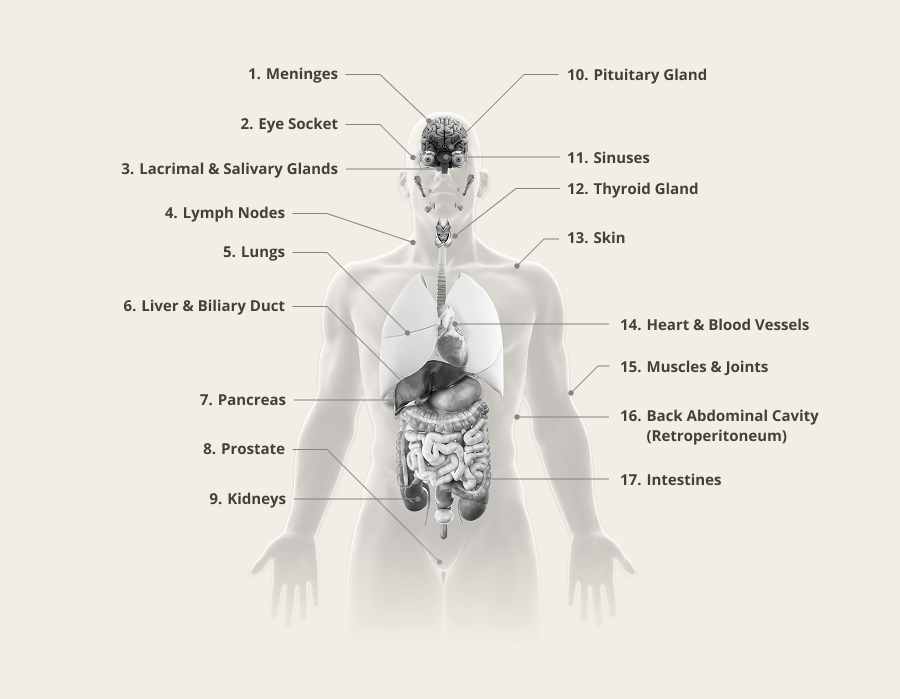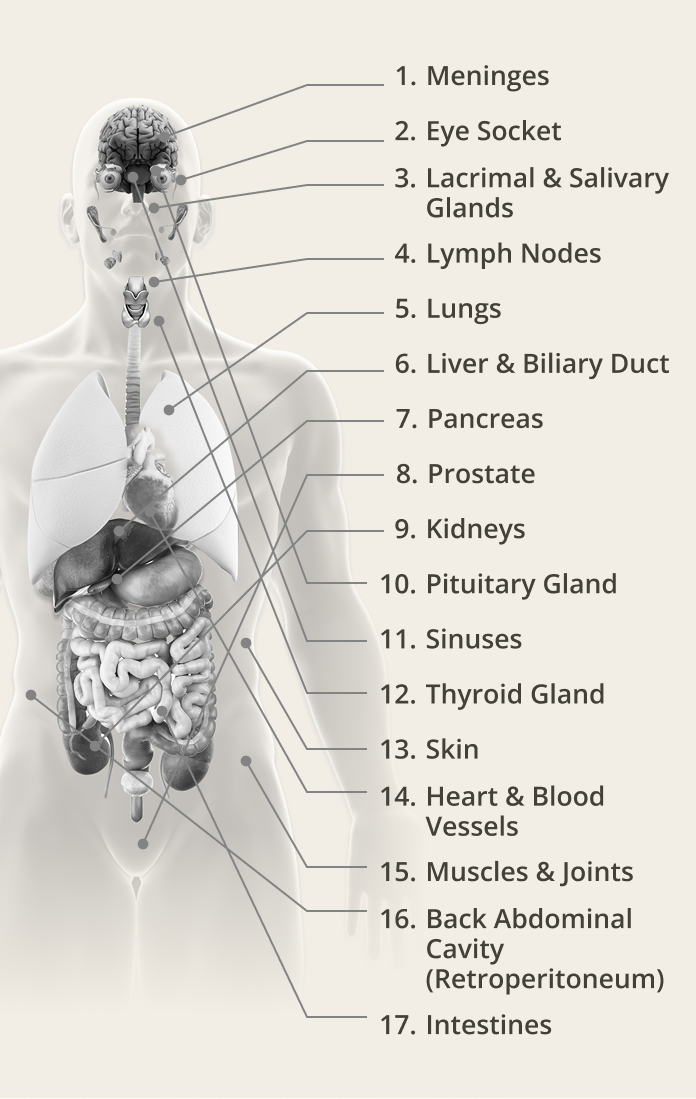You Are Now Leaving IgG4rd.ca
The linked sites are not under the control of Amgen, and Amgen is not responsible for the content available on the linked sites. Such links do not imply Amgen's endorsement of material on any other site, and Amgen disclaims all liability with regard to your access to such linked websites. Amgen provides links to other Internet sites as a convenience to users, and access to such linked sites is at your own risk.
Do You Want to Link to Another Amgen Canada Site?
You are now leaving the IgG4-RD Canada website. Please note that these links are being provided as a convenience and for informational purposes only.


IgG4-RD is a complex condition that can affect many organs, resulting in a range of symptoms depending on the areas that are involved. While some people have no symptoms, others may experience noticeable symptoms in commonly affected organs.
IgG4-RD: Common Symptoms

Lumps or Masses
Unexplained bumps or swelling

Swelling
Especially in the face, hands, or feet

Sinus Issues
Runny nose, sneezing, or sinus congestion

Eye Problems
Irritation, pain, blurry vision, or bulging eyes

Constant Fatigue
Feeling unusually tired or mentally foggy

Weight Changes
Gaining or losing weight without trying

Trouble Breathing
Shortness of breath or difficulty catching your breath

Body Pain
General discomfort, muscle aches, or joint pain
Which Organs Are Affected by IgG4-RD and What Are the Signs?
Symptoms of IgG4-RD can vary from person to person, and some may not notice any signs for a long time. In some cases, it may be mistaken for other conditions, such as different autoimmune diseases or cancer.
Review the chart below to learn more about how IgG4-RD can impact various parts of the body.
Organ-Specific Symptoms of IgG4-RD


-
1. Meninges (Tissue Layers That Protect the Brain & Spinal Cord)
 Inflammation caused by IgG4-RD can lead to nerves issues and seizures.
Inflammation caused by IgG4-RD can lead to nerves issues and seizures. -
2. Eye Socket
 Large masses of tissue and inflamed eye muscles may cause bulging, double vision, and in rare cases, vision loss.
Large masses of tissue and inflamed eye muscles may cause bulging, double vision, and in rare cases, vision loss. -
3. Lacrimal & Salivary Glands

Inflammation of the lacrimal glands (which produce tears) can make the eyes puffy, dry with a gritty feeling, and tender or painful.
Swelling in the neck, jaw, or near the ears can signal inflammation in the salivary glands. Symptoms can include dry mouth, pain while eating, trouble swallowing, and tooth decay.
-
4. Lymph Nodes
 Swollen lymph nodes around the jaw, chest, arms, abdomen, or legs, which may be painful and tender to the touch.
Swollen lymph nodes around the jaw, chest, arms, abdomen, or legs, which may be painful and tender to the touch. -
5. Lungs
 The lining of the lungs can thicken and scar due to IgG4-RD, leading to chronic issues such as fluid buildup around the lungs, airway blockages, difficulty breathing, and chronic coughing.
The lining of the lungs can thicken and scar due to IgG4-RD, leading to chronic issues such as fluid buildup around the lungs, airway blockages, difficulty breathing, and chronic coughing. -
6. Liver & Biliary Duct
 Inflammation and scarring in the bile ducts from IgG4-RD can lead to bile backing up into the liver, causing liver damage over time. This may result in symptoms like yellowing of the skin or eyes (jaundice), upper right abdominal pain, dark urine, pale stools, nausea, vomiting, fatigue, weight loss, and itchy skin.
Inflammation and scarring in the bile ducts from IgG4-RD can lead to bile backing up into the liver, causing liver damage over time. This may result in symptoms like yellowing of the skin or eyes (jaundice), upper right abdominal pain, dark urine, pale stools, nausea, vomiting, fatigue, weight loss, and itchy skin. -
7. Pancreas

Digestion can be affected, which makes it difficult to absorb nutrients. This can cause rapid weight loss.
Blood sugar levels can also be affected, which can develop into diabetes.
-
8. Prostate
 For those born male at birth, the prostate may become inflamed leading to frequent and/or painful urination.
For those born male at birth, the prostate may become inflamed leading to frequent and/or painful urination. -
9. Kidneys
 Kidney inflammation and damage from IgG4-RD can result in symptoms such as pink or dark urine (from blood), foamy urine, and frequent nighttime urination. Swelling may occur in the face, hands, feet, or belly, along with pain in the lower back or sides. Other symptoms can include feeling weak or tired, nausea, muscle cramps, itchy skin, loss of appetite, difficulty breathing, and high blood pressure.
Kidney inflammation and damage from IgG4-RD can result in symptoms such as pink or dark urine (from blood), foamy urine, and frequent nighttime urination. Swelling may occur in the face, hands, feet, or belly, along with pain in the lower back or sides. Other symptoms can include feeling weak or tired, nausea, muscle cramps, itchy skin, loss of appetite, difficulty breathing, and high blood pressure.10. Pituitary Gland
 The pituitary gland, known as the "master gland," regulates many body functions by releasing different hormones. Inflammation from IgG4-RD can cause headaches, vision problems, and diabetes insipidus—a medical condition with symptoms like extreme thirst, passing large amounts of pale urine and waking up at night to drink water and use the bathroom.
The pituitary gland, known as the "master gland," regulates many body functions by releasing different hormones. Inflammation from IgG4-RD can cause headaches, vision problems, and diabetes insipidus—a medical condition with symptoms like extreme thirst, passing large amounts of pale urine and waking up at night to drink water and use the bathroom.11. Sinuses
 Sinus damage and inflammation can lead to a loss of smell and symptoms such as stuffy nose with yellow or green mucus, facial pain or pressure, headaches, coughing, fatigue, ear discomfort, loss of taste or smell, and bad breath.
Sinus damage and inflammation can lead to a loss of smell and symptoms such as stuffy nose with yellow or green mucus, facial pain or pressure, headaches, coughing, fatigue, ear discomfort, loss of taste or smell, and bad breath.12. Thyroid Gland

IgG4-RD can cause inflammation and scarring in the thyroid, leading to thyroiditis. This can cause neck pain, a tight feeling in the throat, or trouble swallowing.
Thyroiditis usually starts with an overactive thyroid, which can lead to symptoms like anxiety, a fast heartbeat, weight loss, sweating, and trouble sleeping. Over time, the thyroid may slow down, causing fatigue, weight gain, depression, dry skin, and sensitivity to cold. This slower phase can sometimes last a long time or become permanent.
13. Skin
 Bumps or raised patches may appear on the skin.
Bumps or raised patches may appear on the skin.14. Heart & Blood Vessels

IgG4-RD can cause blood vessel inflammation, leading to pain in the chest, stomach, or back, headaches, vision changes, fever, shortness of breath, leg swelling, and fatigue. Over time, weakened blood vessels may increase the risk of heart disease.
It can also cause heart inflammation, often resulting in chest pain that spreads to the shoulders, neck, or left arm. This pain may worsen with deep breaths, lying down, or coughing and often improves when sitting up or leaning forward.
15. Muscles & Joints
 Joints may become painful, stiff or swollen.
Joints may become painful, stiff or swollen.16. Back Abdominal Cavity (Retroperitoneum)
 IgG4-RD can cause fibrous tissue to grow and press on nearby organs, leading to back and side pain. In severe cases, scarring may cause a bowel obstruction (a serious medical emergency), which blocks the normal flow of food and waste through the intestines. Symptoms include severe abdominal pain, bloating, nausea, vomiting, and difficulty passing gas or stool.
IgG4-RD can cause fibrous tissue to grow and press on nearby organs, leading to back and side pain. In severe cases, scarring may cause a bowel obstruction (a serious medical emergency), which blocks the normal flow of food and waste through the intestines. Symptoms include severe abdominal pain, bloating, nausea, vomiting, and difficulty passing gas or stool.17. Intestines
 Inflammation of the intestines can cause abdominal pain, diarrhea (sometimes with blood), bloating, and rectal discomfort. In severe cases, it may lead to fatigue, weight loss, and malnutrition.
Inflammation of the intestines can cause abdominal pain, diarrhea (sometimes with blood), bloating, and rectal discomfort. In severe cases, it may lead to fatigue, weight loss, and malnutrition.
Many people with IgG4-RD may go months or even years without showing signs or symptoms. During this time, recurring waves of inflammation, called flares, can silently affect organs. Over time, this ongoing inflammation may lead to organ damage and dysfunction.
Getting a Diagnosis Is a Key Step in Your Journey to Managing IgG4-RD
IgG4-RD, immunoglobulin G4-related disease.



 Precleared.ca
Precleared.ca